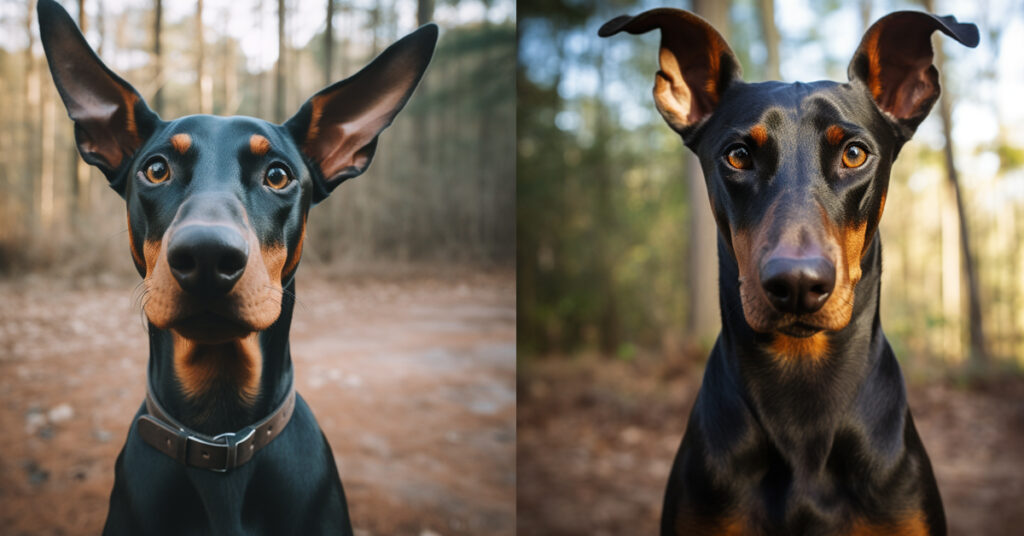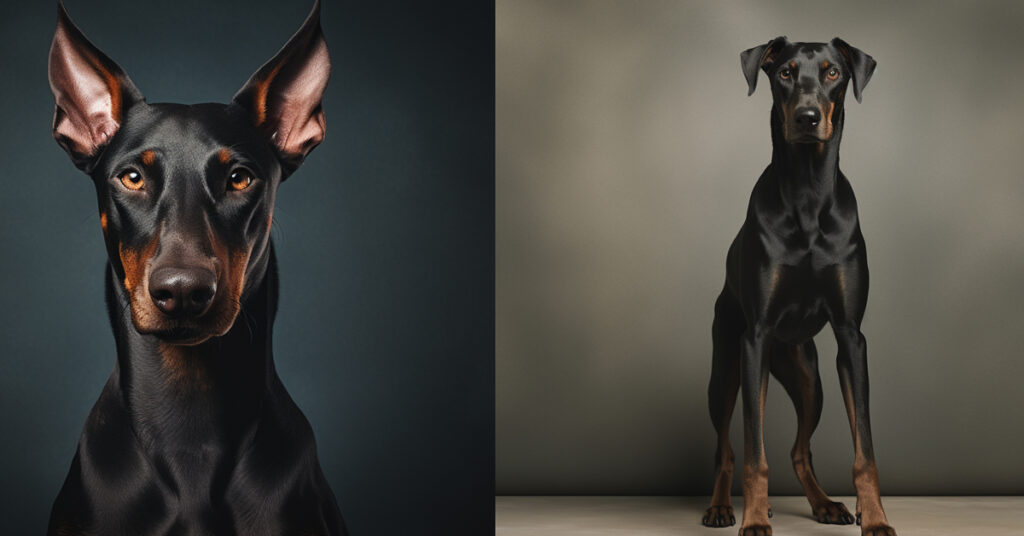Dobermans are known for their sleek and muscular physique, but it’s not uncommon for dog owners to notice that their Doberman appears skinny. This can raise concerns and questions about their dog’s weight and overall health. Understanding why a Doberman may be skinny is crucial for ensuring their well-being and taking appropriate action.
The concerns and questions of dog owners regarding their Dobermans’ weight
Many dog owners worry when they notice their Dobermans looking thin or underweight. They may wonder if their dog is getting enough nutrition or if there’s an underlying health issue causing the weight loss. Questions arise about how much food to feed, what type of diet to provide, and whether exercise plays a role in their Doberman’s weight. These concerns often stem from a genuine desire to ensure their beloved pet is healthy and thriving. In this blog post, we will address these concerns and provide guidance on understanding and addressing a skinny Doberman’s weight.
Understanding the Doberman Breed
Overview of the Doberman breed’s physical characteristics
Dobermans are a striking and elegant breed known for their athletic build and sleek appearance. They have a medium to large-sized body with a muscular frame. Their coat is typically short, smooth, and comes in various colors such as black, blue, red, and fawn. Dobermans have a distinctive wedge-shaped head with a strong jawline and alert, intelligent eyes.
The average weight range for adult Dobermans
The average weight range for adult Dobermans can vary depending on factors such as gender, genetics, and overall health. On average, male Dobermans weigh between 75 to 100 pounds (34 to 45 kilograms), while female Dobermans weigh between 60 to 90 pounds (27 to 41 kilograms). It’s important to note that these are general ranges, and individual Dobermans may fall outside of them while still being healthy.
Potential health issues that can affect their weight
While Dobermans are generally a robust and healthy breed, there are certain health issues that can impact their weight. One common condition is hypothyroidism, where the thyroid gland doesn’t produce enough hormones, leading to a slower metabolism and potential weight gain or difficulty in maintaining a healthy weight.
Another health concern is dilated cardiomyopathy (DCM), a heart disease that can affect Dobermans. DCM can lead to muscle weakness, including the muscles responsible for maintaining weight and body condition. This condition may contribute to weight loss or difficulty in gaining weight.
Other potential health issues that can affect a Doberman’s weight include gastrointestinal problems, parasites, dental issues, and cancer. It’s always important to monitor your Doberman’s weight and consult with a veterinarian if you notice any significant changes or concerns.
Understanding the physical characteristics of the Doberman breed, along with being aware of potential health issues that can impact their weight, is essential for dog owners in recognizing whether their Doberman’s skinny appearance is within a healthy range or requires further attention.

Common Reasons for Skinny Dobermans
Inadequate nutrition and diet
Proper nutrition plays a crucial role in maintaining a healthy weight for Dobermans. A balanced and nutritious diet provides the essential nutrients, vitamins, and minerals necessary for their overall well-being. It supports their metabolism, muscle development, and immune system. Feeding your Doberman a high-quality dog food that is specifically formulated for their breed size and age is essential.
Sometimes, owners unknowingly make feeding mistakes that can contribute to their Doberman’s weight loss. Free-feeding, where food is available at all times, can lead to overeating or under-eating. Inaccurate portion sizes, such as guessing or not adjusting according to their activity level, can also impact their weight. Additionally, giving excessive treats or human food can disrupt their balanced diet.
Health conditions and medical factors
There are various health conditions and medical factors that can contribute to weight loss in Dobermans. As mentioned earlier, hypothyroidism can slow down their metabolism, making it difficult to maintain a healthy weight. Gastrointestinal problems like inflammatory bowel disease or malabsorption issues can affect their ability to absorb nutrients properly, resulting in weight loss.
Certain diseases and disorders can impact a Doberman’s metabolism or appetite, leading to weight loss. For example, Addison’s disease (hypoadrenocorticism) affects the adrenal glands, which play a role in regulating metabolism. Diabetes can also cause weight loss if insulin levels are insufficient. Additionally, dental problems, oral tumors, or mouth pain can make it difficult for Dobermans to eat, resulting in weight loss.
Exercise and activity levels
Exercise is important for maintaining a healthy weight and overall fitness in Dobermans. Regular physical activity helps burn calories, build muscle mass, and support their metabolism. Adequate exercise can help prevent excessive weight loss or obesity. However, it’s crucial to strike a balance and avoid excessive exercise as it can lead to muscle wasting and a skinny appearance.
Insufficient exercise or lack of physical activity can contribute to a Doberman’s weight loss. Without proper exercise, they may not be burning enough calories, leading to a decrease in body weight. On the other hand, excessive activity without proper rest and recovery can strain their muscles and cause weight loss. Finding the right balance and providing appropriate exercise based on their age, health, and energy levels is key to maintaining a healthy body weight.
By understanding the common reasons for skinny Dobermans, including inadequate nutrition, health conditions, and exercise levels, owners can take proactive steps to address these issues and ensure their Doberman maintains a healthy weight and overall well-being.

Identifying if Your Doberman is Truly Underweight
The ideal body condition for Dobermans
Understanding the ideal body condition for Dobermans is crucial in determining whether your dog is truly underweight. Ideally, a Doberman should have a sleek and muscular appearance with a defined waistline. When looking at your Doberman from above, you should be able to see a slight hourglass shape, with a narrowing behind the ribs towards the hips. When running your hands along their sides, you should be able to feel their ribs without them being overly prominent.
Guidelines and methods to assess your Doberman’s weight and body condition
To assess your Doberman’s weight and body condition, several guidelines and methods can be used:
- Visual Inspection: Observe your Doberman’s overall appearance. Are their ribs highly visible or easily felt? Is there a noticeable loss of muscle mass along their spine or hips? These visual cues can indicate whether your Doberman is underweight.
- Body Condition Score (BCS): BCS is a numerical scale ranging from 1 to 9, with 1 being emaciated and 9 being obese. A score of 4 to 5 is typically considered ideal for Dobermans. Consult your veterinarian or refer to reputable sources to learn how to perform a BCS assessment on your Doberman.
- Weighing: Regularly weigh your Doberman using a reliable scale. Keep track of their weight over time to monitor any significant changes. However, note that weight alone may not provide a complete picture, as muscle mass and body composition are equally important.
The importance of consulting with a veterinarian for accurate diagnosis and evaluation
If you suspect that your Doberman is underweight, it is crucial to consult with a veterinarian for an accurate diagnosis and evaluation. A veterinarian can conduct a thorough physical examination, consider your dog’s medical history, and perform necessary tests if needed. They have the expertise to properly assess your Doberman’s weight and body condition, identify any underlying health issues, and provide appropriate recommendations for diet, exercise, or further treatment.
Remember, while visual inspection, body condition scoring, and weighing can provide useful indicators, a veterinarian’s professional assessment is invaluable in determining whether your Doberman is truly underweight and guiding you on the best course of action. Prioritize your Doberman’s health and well-being by seeking professional advice when needed.
Steps to Help Your Skinny Doberman Gain Weight
Consultation with a veterinarian
If you have concerns about your skinny Doberman’s weight, it is crucial to consult with a veterinarian. They will conduct a thorough examination to determine the underlying cause of weight loss and provide an accurate diagnosis. This step is essential to ensure appropriate treatment and management strategies are implemented.
Based on their evaluation, the veterinarian may recommend specific treatment options or dietary changes to help your Doberman gain weight. This could include addressing any underlying health issues, adjusting their diet, or considering supplements. Following their professional guidance will help ensure the most effective approach for your dog’s weight gain journey.
Adjusting the diet and feeding routine
Choosing a high-quality dog food formulated for weight gain can help your skinny Doberman achieve a healthy weight. Look for foods that contain higher levels of protein and healthy fats. Opt for reputable brands that use quality ingredients and consult with your veterinarian to find the best option for your dog’s needs.
To help your Doberman gain weight, it’s important to adjust portion sizes and feeding frequency. Your veterinarian can provide specific guidelines based on your dog’s current weight, target weight, and activity level. Gradually increasing portion sizes and feeding multiple small meals throughout the day can help support weight gain while ensuring proper digestion and nutrient absorption.
Incorporating healthy supplements
Certain supplements or additives can aid in weight gain for your Doberman, but it’s important to consult with your veterinarian before introducing any new additions to their diet. Supplements such as omega-3 fatty acids or digestive enzymes may be recommended to support overall health and nutrient absorption.
Your veterinarian will have the expertise to recommend specific supplements, determine appropriate dosages, and assess any potential interactions or contraindications. They will also monitor your Doberman’s progress and adjust the treatment plan as needed. Always consult with them before adding any supplements to ensure your dog’s safety and well-being.
Remember, helping your skinny Doberman gain weight requires a comprehensive approach that includes professional guidance from a veterinarian, adjusting their diet and feeding routine, and potentially incorporating appropriate supplements. By following these steps and working closely with your veterinarian, you can support your Doberman’s weight gain journey and help them achieve a healthy and balanced physique.
Conclusion
In this blog, we explored common reasons for skinny Dobermans and provided insights into identifying if your Doberman is truly underweight. We discussed the importance of a balanced and nutritious diet, the impact of health conditions on weight loss, and the role of exercise and activity levels. We also highlighted the ideal body condition for Dobermans and provided guidelines for assessing their weight and body condition.
Take proactive steps towards addressing their Doberman’s weight concerns
If you have concerns about your Doberman’s weight, it’s important to take proactive steps towards addressing them. By understanding the common reasons for skinny Dobermans and learning how to assess their weight and body condition, you can better identify if intervention is needed. Taking action early can help prevent further weight loss and improve your Doberman’s overall well-being.
Consultation with a veterinarian for personalized guidance
While this blog provides valuable information, it’s essential to remember that each Doberman is unique, and consulting with a veterinarian is crucial for personalized guidance. They possess the expertise to accurately diagnose any underlying health issues, recommend appropriate treatment options, and provide tailored dietary and exercise recommendations. Your veterinarian will consider your individual Doberman’s age, medical history, and specific needs to devise the best plan of action.
Note: Remember to consult with a veterinarian for specific advice regarding your individual Doberman’s health and weight concerns. They are the best resource to provide personalized guidance based on your dog’s unique circumstances.
By being proactive and seeking professional guidance, you can ensure that your Doberman receives the necessary support to achieve a healthy weight and lead a happy, active life. Prioritize your Doberman’s well-being and consult with a veterinarian for the best course of action.
